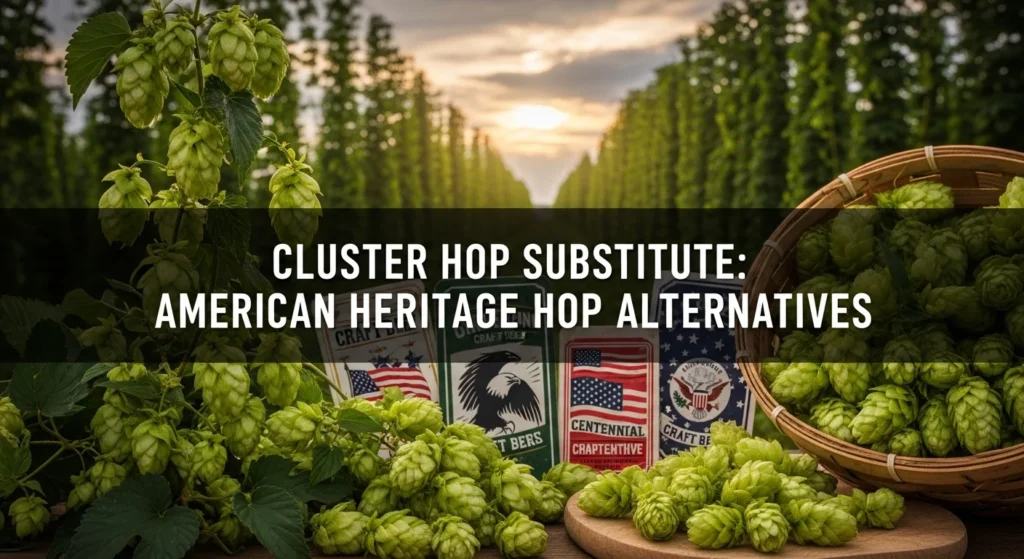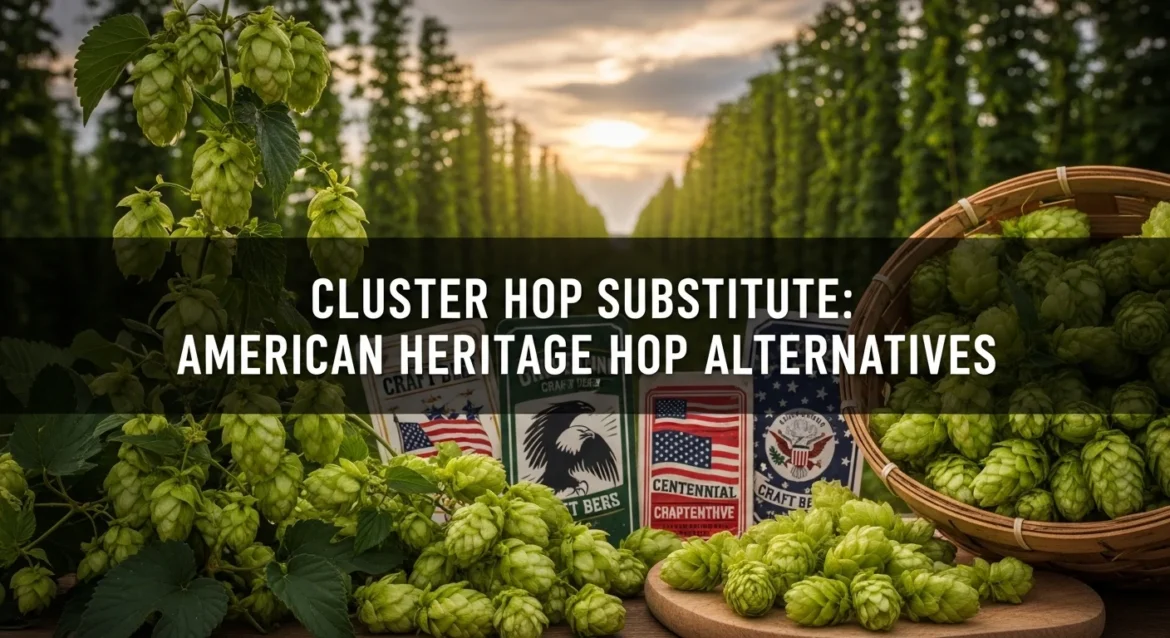Find the best Cluster hop substitutes with American heritage character. Discover traditional and modern alternatives for pre-Prohibition and classic American beers.

Planning that authentic pre-Prohibition lager with Cluster hops only to discover they’re sold out at your supplier? I’ve faced that exact frustration more times than I care to count in my brewing career. This historic American heritage hop has maintained its status as one of America’s oldest cultivated varieties, creating demand from brewers seeking authentic pre-Prohibition character that occasionally exceeds availability. The good news? Several American-grown hop varieties can replicate those distinctive earthy, spicy, and floral notes with subtle blackcurrant backing that makes Cluster essential for historic American styles.
Finding the right Cluster hop substitute requires understanding what makes this hop special beyond just being American. It’s about capturing that distinctive combination of earthy complexity, spicy character, and subtle blackcurrant-floral notes with moderate alpha acids that defined American brewing for over a century. After brewing with Cluster and testing various alternatives over the past decade, I’ve identified which substitutes actually deliver on their heritage promises and which fall disappointingly short when authentic American character matters.
This guide explores proven alternatives that maintain your beer’s intended flavor profile while honoring brewing history. Whether you’re brewing a pre-Prohibition lager, California common, or traditional American porter, you’ll find practical solutions that work.
Understanding Cluster’s American Heritage
Cluster represents one of America’s oldest hop varieties, with cultivation dating back to the early 1800s. This dual-purpose hop delivers earthy, spicy, floral, blackcurrant, and robust characteristics with moderate alpha acids of 5.5-8.5%. What distinguishes Cluster from modern American hops is its remarkably historic character combining traditional earthy-spicy notes with subtle blackcurrant complexity that defined American brewing before Prohibition when homebrewing equipment was simpler but traditions ran deep.
The hop’s development occurred through natural selection and careful cultivation over generations of American hop farming. Cluster dominated American brewing throughout the 1800s and early 1900s, providing the backbone for pre-Prohibition lagers, ales, and porters that defined American brewing heritage. The variety’s moderate alpha acids create balanced bittering while its distinctive earthy-spicy-blackcurrant aromatics provide authentic American character.
When I first brewed with Cluster in a pre-Prohibition lager six years ago, the subtle earthy-spicy aroma with blackcurrant backing created exactly the historic American character I sought. That authentic, understated quality is Cluster’s magic – traditional enough to honor American brewing heritage yet versatile enough for diverse applications.
Top Cluster Hop Substitute Options
Galena: Modern American Earthy
Galena stands as a logical Cluster substitute for brewers seeking American earthy character with higher bittering power. This American variety delivers earthy, citrus, mild fruit, and clean characteristics with high alpha acids of 12-14% that provide significantly more bittering efficiency.
Released by USDA breeding in 1978, Galena represents modern American high-alpha development. While offering higher alpha acids and cleaner character, Galena’s earthy-citrus profile creates alternatives when efficient bittering with subtle American earthiness matters.
I’ve successfully substituted Galena for Cluster in porters and stouts by using approximately 60-70% as much by weight to compensate for higher alpha acids. The beer’s character maintains American earthy nature while shifting toward cleaner citrus rather than traditional spicy-blackcurrant. Use Galena when you want American character with increased bittering efficiency from the Brewers Association standards.
Eroica: Heritage American Alternative
Eroica brings earthy, spicy, floral, and herbal characteristics with high alpha acids of 10-13%. This American variety bred from Cluster and Brewer’s Gold provides earthy-spicy character with direct Cluster heritage.
Released from USDA breeding, Eroica shares Cluster’s genetic lineage. While offering higher alpha acids, Eroica’s earthy-spicy-floral profile echoes Cluster’s character while providing modern bittering efficiency.
When substituting Eroica for Cluster, use approximately 65-75% of original amounts to compensate for higher alpha acids. The beer maintains heritage American earthy-spicy nature with less pronounced blackcurrant, creating authentic alternatives for historic styles.
Nugget: American Herbal-Resinous
Nugget delivers herbal, spicy, resinous, and heavy characteristics with high alpha acids of 12-14%. This American workhorse provides powerful bittering with herbal-spicy character similar to some of Cluster’s complexity.
Released by USDA breeding in 1970, Nugget represents classic American high-alpha development. While lacking Cluster’s specific blackcurrant character, Nugget’s herbal-spicy profile creates alternatives when American bittering power matters.
Use approximately 60-70% as much Nugget by weight when substituting for Cluster to compensate for significantly higher alpha acids. The beer’s character shifts toward herbal-resinous rather than earthy-blackcurrant, creating traditional high-alpha American profiles.
Magnum: Clean Neutral Bittering
Magnum offers clean, mild, slightly floral, and neutral characteristics with high alpha acids of 12-17%. This German-American variety provides exceptionally clean bittering that can replace Cluster’s efficiency while offering minimal flavor contribution.
Developed in Germany then cultivated in America, Magnum shares emphasis on clean, efficient bittering. While lacking Cluster’s earthy-spicy-blackcurrant character, Magnum’s remarkably neutral profile creates alternatives when pure bittering efficiency matters most.
When substituting Magnum for Cluster, use approximately 55-70% of original amounts to compensate for higher alpha acids. The hop’s exceptionally clean character works perfectly for bittering additions where neutral bitterness supports rather than dominates.
Northern Brewer: Woody-Mint Traditional
Northern Brewer brings woody, mint, earthy, and herbal characteristics with moderate alpha acids of 8-10%. This German-American variety provides earthy character similar to Cluster’s traditional nature.
Developed in England in 1934 then cultivated widely, Northern Brewer shares emphasis on earthy-herbal character. While lacking Cluster’s blackcurrant notes, Northern Brewer’s woody-mint-earthy profile creates alternatives when traditional character with moderate alpha acids matters.
Use approximately 80-95% of Cluster quantities when substituting Northern Brewer thanks to similar alpha acids. The beer maintains traditional earthy character with woody-mint emphasis rather than spicy-blackcurrant complexity.
Chinook: Pine-Grapefruit American
Chinook delivers pine, spicy, grapefruit, and herbal characteristics with high alpha acids of 12-14%. This American classic provides bold character that differs significantly from Cluster’s subtlety.
Released in 1985, Chinook defined modern American hop-forward brewing. While lacking Cluster’s earthy-blackcurrant character, Chinook’s pine-grapefruit profile creates alternatives when bold American hop flavor matters more than historic subtlety.
When substituting Chinook for Cluster, use approximately 60-70% of original amounts to compensate for higher alpha acids. The beer’s character shifts dramatically toward pine-grapefruit rather than earthy-blackcurrant, creating modern American profiles.
Blending Strategies for Complete Substitution
The 70/30 Heritage Blend
My most successful Cluster replacement combines 70% Eroica with 30% Northern Brewer. This blend captures Eroica’s earthy-spicy Cluster heritage while Northern Brewer adds woody-earthy traditional complexity approximating Cluster’s complete earthy-spicy-floral profile. The combination creates more authentic heritage character than either hop alone.
Calculate your total hop bill first, then split according to this ratio for all additions. Use reduced quantities (approximately 65-75% of original Cluster amounts) to compensate for higher combined alpha acids while achieving traditional American character.
The Clean Bittering Approach
For maximum efficiency, use Magnum alone for bittering additions then add small amounts of Northern Brewer for late additions to capture earthy character. This strategy maximizes bittering efficiency while preserving subtle traditional aromatics.
Use reduced Magnum quantities (approximately 60% of original Cluster amounts) for bittering, then add Northern Brewer at flameout for authentic earthy finishing character.
Single-Hop Simplicity
Sometimes simplicity wins. For straightforward beers where Cluster heritage matters most, Eroica alone provides closest substitution despite requiring reduced weights. The hop’s direct Cluster lineage makes it ideal when genetic heritage defines priorities.
For beers demanding traditional earthy character, Northern Brewer by itself works at similar quantities. The hop’s woody-earthy nature creates compelling alternatives when moderate alpha acids with traditional character matter.
Beer Style Considerations
Pre-Prohibition Lagers
These historic American styles showcase Cluster beautifully. Eroica or Northern Brewer work exceptionally well as substitutes, providing authentic earthy-spicy character that honors American brewing heritage.
Use moderate hopping rates (0.75-1.5 oz per gallon total) with restrained bittering (20-35 IBUs) and gentle late additions. Historic American brewing demonstrates that subtlety creates authentic pre-Prohibition character.
California Common and Steam Beer
This unique American style benefits from Northern Brewer (traditionally used) or Eroica substitutions that provide woody-earthy character complementing toasted malt and warm-fermented lager yeast.
Use moderate-generous hopping rates (1.25-2 oz per gallon total) with balanced bittering (30-45 IBUs). California common brewing showcases traditional American hop character with distinctive regional identity.
American Porters and Stouts
Dark roasted styles showcase Galena or Nugget where efficient clean bittering complements chocolate and coffee malt flavors without excessive hop flavor.
Keep total hop rates moderate (0.75-1.5 oz per gallon) focusing on firm bittering (30-50 IBUs) that supports roasted malt complexity.
Here is the comparison chart:
Cluster Hop Substitute Comparison Chart – Alpha Acids, Flavors, and Beer Style Compatibility
Timing Your Hop Additions for Heritage Character
Moderate Bittering (60 Minutes)
Cluster’s moderate alpha acids (5.5-8.5%) create balanced bittering appropriate for historic American styles. Use Cluster substitutes at 60 minutes to establish baseline bitterness.
I typically use 0.75-1.5 oz per gallon at 60 minutes with Cluster substitutes to establish baseline bitterness around 25-40 IBUs appropriate for pre-Prohibition lagers and traditional American ales. The moderate bittering creates balance characteristic of historic brewing.
Flavor Additions (15-20 Minutes)
This window captures earthy-spicy character beautifully. Eroica and Northern Brewer excel here, releasing traditional aromatics that integrate smoothly.
Add 0.25-0.75 oz per gallon at 15 minutes for traditional American styles. This timing extracts flavor while preserving delicate aromatics that define heritage brewing.
Late Additions and Flameout
The final 5 minutes and flameout maximize earthy-spicy-floral character while controlling bitterness. This technique suits all Cluster substitutes by preserving subtle aromatics.
Use restrained quantities (0.1-0.5 oz per gallon) at flameout to add final aromatic layers. Historic American brewing emphasizes restraint where subtle character defines authenticity.
Limited Dry Hopping
Traditional American brewing rarely employed aggressive dry hopping. When dry hopping historic styles, use very restrained quantities (0.25-0.5 oz per gallon) for 3-4 days maximum.
Excessive dry hopping creates modern character inappropriate for historic styles. Traditional approaches create more authentic heritage profiles.
Adjusting for Alpha Acids and Character
Understanding Cluster’s Moderate Profile
Cluster’s moderate alpha acids (5.5-8.5%) create balanced dual-purpose versatility typical of heritage varieties. Most modern substitutes have higher alpha acids requiring quantity reductions.
Use this formula: (Cluster AA% ÷ Substitute AA%) × Original Amount = Substitute Amount. For example: (7% ÷ 13%) × 2 oz = 1.08 oz of Galena needed to replace 2 oz of Cluster for equivalent bitterness.
Oil Content and Heritage Character
Cluster’s moderate oil content creates distinctive earthy-spicy-blackcurrant character. Substitutes with different oil compositions emphasize different flavors – Eroica provides earthy-spicy heritage, Galena adds clean-earthy, and Northern Brewer contributes woody-mint complexity.
Water Chemistry for American Expression
Soft to Moderate Minerals
Historic American brewing utilized diverse water profiles. For pre-Prohibition lagers, target soft to moderately hard water with balanced minerals (sulfate and chloride both 50-150 ppm).
Traditional American styles demonstrate that balanced water supports malt and hop character without harsh mineral edges.
Burton-Style for Pale Ales
For American pale ales, higher sulfate (200-300 ppm) accentuates hop character creating crisp, dry finishes appropriate for hop-forward interpretations.
Yeast Strain Synergies
American Lager Yeast
For pre-Prohibition lagers and California common, clean lager yeasts (WLP840, WLP810/W-34/70) create authentic foundations where subtle hop character shines.
Ferment at appropriate temperatures (48-58°F for traditional lagers, 58-65°F for California common) to create clean profiles that honor historic brewing.
American Ale Yeast
For American ales and porters, clean American yeasts (WLP001/US-05) provide neutral canvases where heritage hop character expresses clearly.
Ferment at moderate temperatures (66-68°F) to create clean ales showcasing traditional American hop profiles.
Sourcing and Availability
Cluster Accessibility
Cluster enjoys moderate availability through American hop suppliers as heritage variety. When available, expect moderate pricing ($10-16 per pound) for this historic American hop.
The hop’s heritage status maintains interest among brewers crafting historic and traditional American styles.
Substitute Availability
Most Cluster substitutes enjoy good-excellent availability. Galena, Nugget, Magnum, Northern Brewer, and Chinook stock reliably year-round through major suppliers at competitive prices ($10-16 per pound). Eroica faces more limited availability as less common heritage variety.
Storage Best Practices
Store all hops in oxygen-barrier bags in your freezer at 0°F or below. Traditional hop aromatics maintain quality for 6-9 months frozen with gradual degradation affecting subtle character.
Common Substitution Mistakes
Using Bold Modern Hops
Substituting Cluster with aggressive modern citrus hops completely misses heritage character. Historic hop substitution requires traditional varieties emphasizing earthy-spicy rather than bold citrus-tropical.
Wrong Alpha Acid Calculations
Failing to adjust quantities when using higher-alpha substitutes creates excessive bitterness inappropriate for balanced historic styles.
Over-Hopping Traditional Styles
Applying modern hopping rates to historic styles creates hop-bomb character that misses authentic pre-Prohibition restraint.
Frequently Asked Questions
What is the closest substitute for Cluster hops?
Eroica provides closest overall match with direct Cluster heritage and similar earthy-spicy-floral character, though with higher alpha acids (10-13%) requiring reduced quantities (65-75% of original amounts). Northern Brewer offers traditional earthy alternative with similar moderate alpha acids (8-10%) using slightly reduced amounts. Blend 70% Eroica with 30% Northern Brewer for most complete earthy-spicy substitution.
Can I use just one hop instead of Cluster?
Yes, single-hop substitutions work well depending on priorities. Eroica excels in historic styles emphasizing Cluster heritage. Northern Brewer suits traditional American beers with woody-earthy character. Galena works in styles needing efficient bittering with earthy backing. Choose based on desired heritage authenticity and alpha acid requirements.
How much substitute hop should I use compared to Cluster?
For Eroica (11.5% AA) replacing Cluster (7% AA), use approximately 0.61× the amount for equivalent bitterness. For Northern Brewer (9% AA), use about 0.78× original amounts. For Galena (13% AA), use roughly 0.54× Cluster quantities. Adjust based on specific alpha acid percentages using the formula provided.
Do these substitutes work in all beer styles?
Cluster substitutes adapt well across traditional American and heritage styles. Eroica and Northern Brewer suit pre-Prohibition lagers, California common, and traditional ales. Galena and Nugget work in American porters and stouts. Avoid using heritage hops in aggressive modern IPAs where subtle character gets overwhelmed by bold bitterness.
When should I add these hops during brewing?
Use moderate bittering additions (0.75-1.5 oz per gallon at 60 minutes) establishing balanced bitterness (25-40 IBUs) appropriate for historic styles. Moderate flavor additions (0.25-0.75 oz per gallon at 15 minutes) add traditional character. Restrained late additions (0.1-0.5 oz per gallon at flameout) maintain authentic heritage profiles. Minimal dry hopping preserves historic authenticity.
Will my beer taste exactly the same with substitutes?
No substitute perfectly replicates Cluster’s exact earthy-spicy-blackcurrant combination with historic American heritage, but well-chosen alternatives create equally authentic traditional character. Eroica emphasizes earthy-spicy Cluster heritage, Northern Brewer provides woody-earthy traditional, and Galena adds clean-earthy efficiency maintaining American brewing authenticity.
Where can I buy these substitute hops?
Major online suppliers like Yakima Valley Hops, Northern Brewer, and BSG Craft Brewing stock most Cluster substitutes year-round. Galena, Nugget, Magnum, Northern Brewer, and Chinook maintain excellent availability with competitive pricing. Eroica faces limited availability through specialty suppliers focusing on heritage varieties.
How should I store substitute hops?
Store all hops in oxygen-barrier packaging (vacuum-sealed mylar bags) in freezer at 0°F or below. Heritage hop aromatics maintain quality for 6-9 months frozen with subtle earthy-spicy notes fading faster than bold modern citrus. Use freshest hops for late additions where traditional character matters most.
Making Your Final Choice
Selecting the perfect Cluster hop substitute depends on your beer style, desired heritage authenticity, and hop availability. Eroica offers closest genetic matching for brewers seeking authentic Cluster heritage in pre-Prohibition lagers and traditional American styles where historic character defines the beer.
Northern Brewer provides traditional American alternative for brewers seeking woody-earthy character with moderate alpha acids. Its versatile nature works beautifully in California common and traditional American ales.
Galena delivers efficient modern option for brewers prioritizing clean bittering with earthy backing. Its high alpha acids create practical alternatives when brewing efficiency matters alongside American character.
Remember that exceptional historic beer comes from respecting brewing heritage while adapting practically to ingredient availability. Cluster substitutions honor American brewing traditions while acknowledging modern realities of hop sourcing.
Don’t be afraid to blend heritage varieties for complete character, use Eroica for authentic lineage, or embrace efficient Galena when practical brewing matters. The craft brewing community continues proving that thoughtful substitution creates authentic results worthy of American brewing heritage.
Whether you’re crafting a pre-Prohibition lager, California common, or traditional American porter, these Cluster substitutes will help you create exceptional beer that captures earthy-spicy-blackcurrant heritage character. Trust proper calculations, brew with traditional restraint, and embrace the historic authenticity that makes American heritage brewing so distinctive and rewarding.
About the Author
Dave Hopson is a certified Cicerone and beer historian who has visited over 200 breweries across 15 countries. With a background in anthropology and culinary arts, Dave brings a unique perspective to understanding beer’s cultural significance and American hop heritage. He specializes in documenting regional brewing traditions and how they’ve evolved with modern craft movements, with particular focus on pre-Prohibition American brewing history.
His research on historic American hop varieties has been featured in several brewing publications. Dave hosts the popular podcast “Hop Tales,” where he interviews brewers about their cultural inspirations and brewing philosophies. When not exploring brewing cultures, Dave enjoys analyzing heritage hop varieties and teaching workshops focused on American brewing history. Connect with him on Instagram for global beer culture insights and heritage hop explorations.

